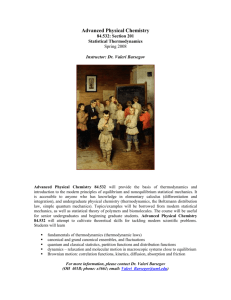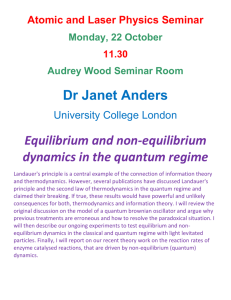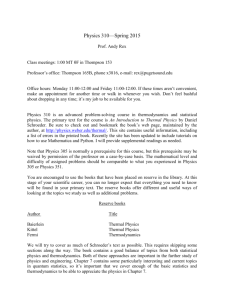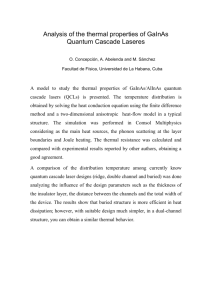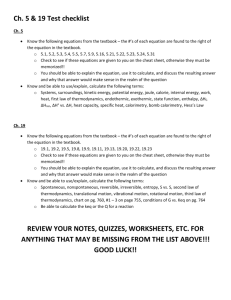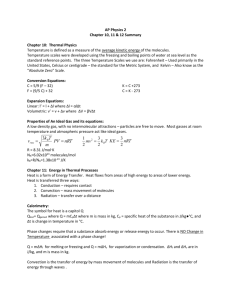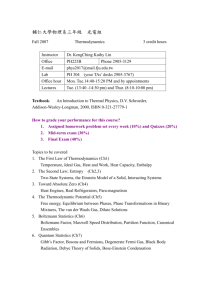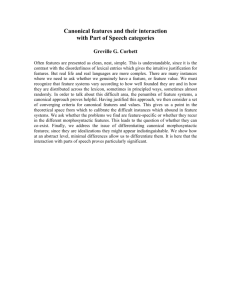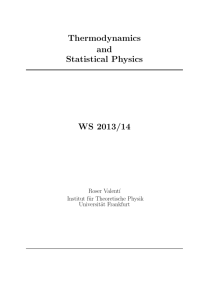Syllabus
advertisement
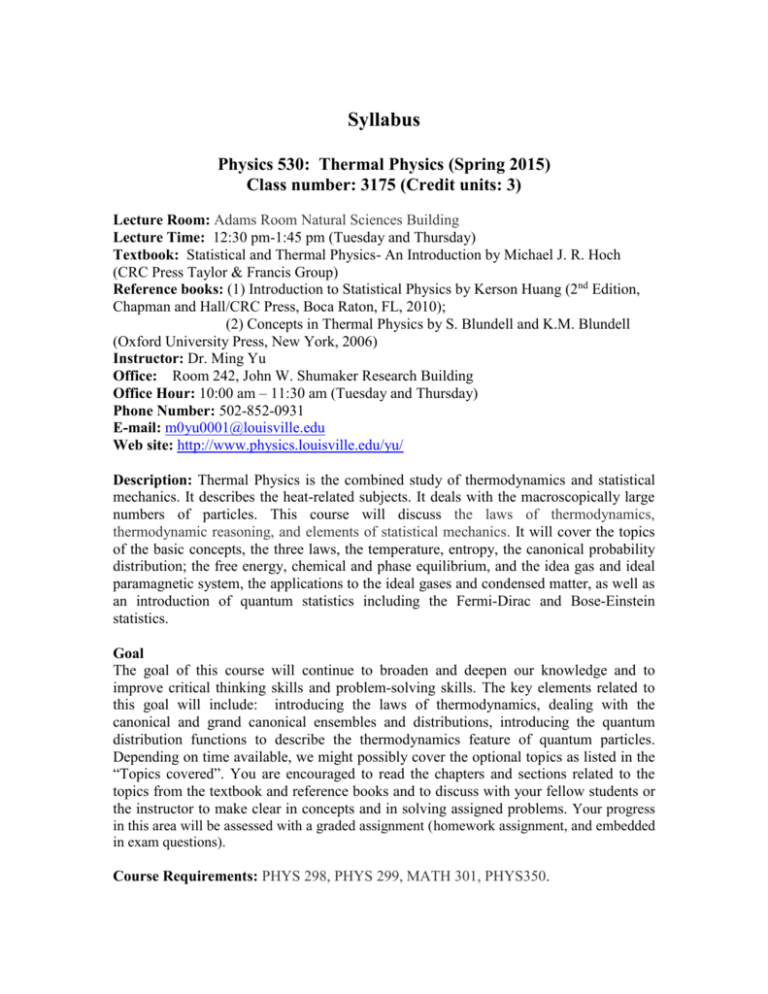
Syllabus Physics 530: Thermal Physics (Spring 2015) Class number: 3175 (Credit units: 3) Lecture Room: Adams Room Natural Sciences Building Lecture Time: 12:30 pm-1:45 pm (Tuesday and Thursday) Textbook: Statistical and Thermal Physics- An Introduction by Michael J. R. Hoch (CRC Press Taylor & Francis Group) Reference books: (1) Introduction to Statistical Physics by Kerson Huang (2nd Edition, Chapman and Hall/CRC Press, Boca Raton, FL, 2010); (2) Concepts in Thermal Physics by S. Blundell and K.M. Blundell (Oxford University Press, New York, 2006) Instructor: Dr. Ming Yu Office: Room 242, John W. Shumaker Research Building Office Hour: 10:00 am – 11:30 am (Tuesday and Thursday) Phone Number: 502-852-0931 E-mail: m0yu0001@louisville.edu Web site: http://www.physics.louisville.edu/yu/ Description: Thermal Physics is the combined study of thermodynamics and statistical mechanics. It describes the heat-related subjects. It deals with the macroscopically large numbers of particles. This course will discuss the laws of thermodynamics, thermodynamic reasoning, and elements of statistical mechanics. It will cover the topics of the basic concepts, the three laws, the temperature, entropy, the canonical probability distribution; the free energy, chemical and phase equilibrium, and the idea gas and ideal paramagnetic system, the applications to the ideal gases and condensed matter, as well as an introduction of quantum statistics including the Fermi-Dirac and Bose-Einstein statistics. Goal The goal of this course will continue to broaden and deepen our knowledge and to improve critical thinking skills and problem-solving skills. The key elements related to this goal will include: introducing the laws of thermodynamics, dealing with the canonical and grand canonical ensembles and distributions, introducing the quantum distribution functions to describe the thermodynamics feature of quantum particles. Depending on time available, we might possibly cover the optional topics as listed in the “Topics covered”. You are encouraged to read the chapters and sections related to the topics from the textbook and reference books and to discuss with your fellow students or the instructor to make clear in concepts and in solving assigned problems. Your progress in this area will be assessed with a graded assignment (homework assignment, and embedded in exam questions). Course Requirements: PHYS 298, PHYS 299, MATH 301, PHYS350. Topics covered 1. Classical Thermal Physics Concepts 1.1 Basic Concepts (Chapter 1) 1.2 The First Law (Chapter 2) 1.3 The Second Law (Chapter 3) 2. Microstates and the Statistical Interpretation of Entropy 2.1 Microstates for Large Systems (Chapter 4) 2.2 Entropy and Temperature (Chapter 5) 2.3 The Third Law (Chapter 6) 3. Applications of Thermodynamics 3.1 Gases (Chapter 7) 3.2 Condensed Matter (Chapter 8) 3.3 Phase Transitions and Critical Phenomena (Chapter 9-Optional) 4. Quantum Statistical Physics 4.1 Ensembles and Canonical Distribution (Chapter 10) 4.2 Grand Canonical Distribution (Chapter 11) 5. Quantum Distribution Functions 5.1 Fermi-Dirac and Bose-Einstein Distributions (Chapter 12) 5.2 Idea Fermi Gas (Chapter 13) 5.3 Idea Bose Gas (Chapter 14) 5.4 Photons and Phonons (Chapter 15-Optional) Homework Homework assignments will be distributed at end of each chapter. The corresponding due dates for Homework will be written on the Homework assignments. You are asked to accomplish the general problems. Your solutions for each problem must include not only the final answers but intermediate steps. Homework assignments will be collected and graded, and form part of your final score. You may discuss homework problems with your fellow students. In fact, you are encouraged to work as a group. However, the final write-up must be your own. Exams There will be two in-class exams: one is the midterm exam and the other is the final exam. The midterm exam is tentatively scheduled on March 12, and the final exam is scheduled on April 28. Class Participation Class participation will be monitored throughout the semester. You are basically required to attend the class otherwise, with an excuse. Each absence without an excuse will cost 0.5 point. It is true that certain individuals are able to learn physics solely from a textbook and may think that lectures are unnecessary. It is also true that most part of the course follows the text book basically, but (1) more explanations which do not appear in a typical textbook will be given in class (2) some of the topics of the course are even not covered by the textbook. Participation will provide you the opportunity to gain more, to ask questions as well as clarifying explanations. Grading Policy The final scores will be based on the two exams and the homework with breakdown as follows: Homework 30% Midterm Exam 35% Final Exam 35% The letter grades will be assigned based on the final scores. The approximate cutoffs are: Grade A+ A A_ B+ B B_ C+ C C_ D+ D D- Cutoff 96 90 82 75 70 65 55 50 41 38 35 32 * Please note that the scheduled exam date and above cutoffs are tentative. The instructor reserves the right to lower the cutoffs if deemed necessary. The cutoffs, however, will not be raised in any cases.
